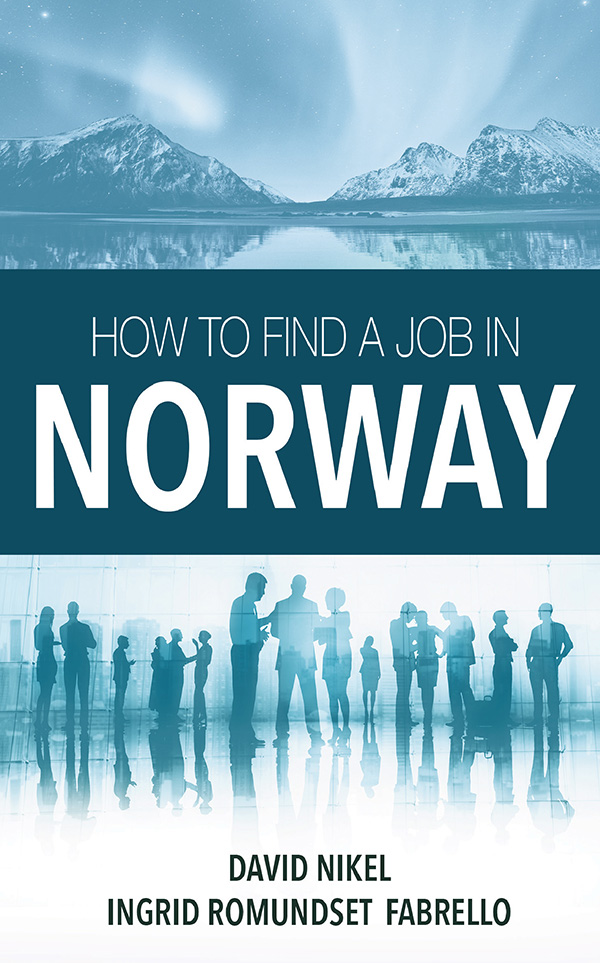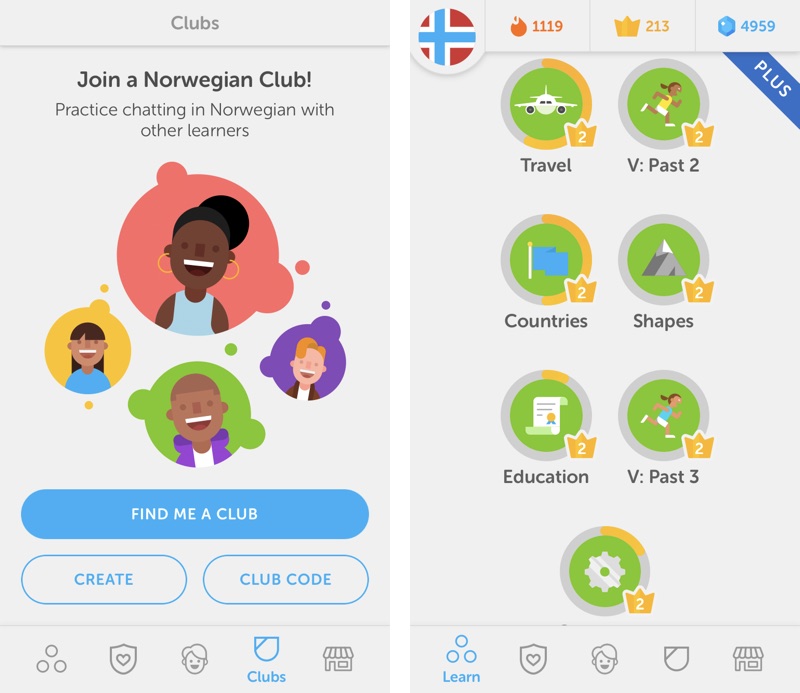
The co-author of How to Find a Job in Norway outlines her top tips for finding employment.
As an employment counsellor in Trondheim, I meet foreign job seekers every day. Most of them have lived in Norway for a while already, ranging from six months to several years.
When I meet them, I often tell them some facts about job seeking in Norway that would have been very helpful to know from the start.

Here are my five most important tips to becoming a successful job seeker in Norway. You'll find more on each of these and loads more tips in my new book, How to Find a Job in Norway.
Learn Norwegian ASAP
In Norway, you need to know Norwegian to be part of the job market. It is that simple. Even though many Norwegians manage English pretty well, and they are happy to switch to English when they talk to you, it is a different story once you are a job seeker.
The spoken and written language at virtually any company in Norway is Norwegian, and if your position requires teamwork or client contact, there is no way around it.
A year ago, many oil and gas companies who were recruiting engineers only required English proficiency, but as the competition for the few open positions has increased, most of these companies now also require Norwegian proficiency.

Some recruitment companies also carry out a policy where they only consider job seekers who speak Norwegian. Read more here about learning Norwegian quickly.
Start integrating immediately (aka volunteer)
Most foreigners I meet has this frame of mind: “Once I find a job I will start integrating into Norwegian society”. However, the truth is that to find a job, you have to start by turning this around.
One of the best ways to find a job in Norway is by integrating into society through volunteering, participating in sports or other organized activity. This is because one of the most important ingredients in a successful hiring process in Norway is trust.
If you happen to volunteer at Red Cross together with the brother in-law of the manager at the company where you are applying, this connection might prove very helpful.
In addition, working as a volunteer gives you the chance to practice Norwegian (see first point), and provides you with a Norwegian work reference. Having a Norwegian work reference that your future boss can call to verify who you are, is very important.
If all your work references are from you home country, the chances that your future boss will call them gets smaller the further away from Norway your country is.
Show up in person
When you apply for an open position in Norway, chances are that there are between 60 to 120 applicants for the position. Even though many of these might not be fully qualified for the position, chances are that around twenty applicants are qualified.

So, since five to ten fully-qualified applicants will get the call for the first interview, how do you stand out in a positive way to make sure you are one of them?
The best policy here is to show extra interest in the position. Anyone can send a cover letter and CV via email, but if you either call or drop by the office to ask how the application process is going, there is a much better chance that they will consider you for the interview.
Make sure you do not misunderstand the social codes here though! (See fifth point)
Build your professional network
Creating your network is closely related to the second point – integrating. If you volunteer, you are effectively creating a network. There are also a lot of open networking events arranged by either the chambers of commerce in each city, or the companies themselves.
Go to all events you find slightly interesting/relevant – you never know who you might meet! A great way to learn about the events is by following the companies on Twitter and Facebook. Check the website of the chamber of commerce in your city as well.
Avoid understanding networking as a quest to small talk with the manager of a company – in Norway; chances are that anyone you hit it off with might become a reference for you in the future.

This might be part of our egalitarian work structure. If the second assistant tells the manager that a good friend of hers is applying for the open position, there's a good chance the manager calls the friend to the interview because of this.
Understand Norwegian social codes
Most Norwegians seem introvert when you come from abroad, and I guess we are as well. However, make sure you do not confuse introvert with uninterested.
We might seem too busy when you call or our body language is normally far from breaking into a spontaneous salsa dance when you show up at our office, but that does not mean that we are not interested in what you have to offer.
Many foreign job seekers I meet have a low perseverance when they contact a company/apply for a position, because they assume that when someone is too busy to talk to them it is because they are not interested.
It is your job as a job seeker to be persistent and to show that you are interested. If someone tells you that they are busy and that you should call back in two weeks, then that is exactly what you should do.
Avoid interpreting the answer as a rejection. If they tell you that there are no vacancies and nothing else, then yes, that means there is no need to call back.

All of these tips demand long-term commitment and effort, so the sooner you start the better. Finding a job in Norway normally takes longer than most foreign job seekers expect, but by investing in these five tips from the start, you are much more likely to find a job in the end.
By being proactive from the beginning of your stay here, you also avoid getting into the job seeker’s rut/depression that many job seekers tend to suffer from after a while.


A vicious circle exists in Norway, and certainly not least in Trondheim which is this.
1) As stated quite clearly in point #1 You need to speak Norwegian to stand even half-a-chance in the job market, but to learn Norwegian “properly” requires you to attend a course, not just any course but a good one which requires many hours of practice in the classroom.which brings me to point 2
2) To enroll on a course costs money, quite a lot of money
3) You need a job to earn the money to pay for the course (which is pretty much essential due to the demand to speak Norwegian at work)
4) Yey! back to step #1 – Snakk Norsk, use magic if necessary.
But, the most disappointing part is knowing that it’s “your” problem, if you want to work here then go figure.
Sadly Norway and particularly Trondheim sucks in and spits out more people due to this than anything else and it wouldn’t be such a slap in the face if you knew that people couldn’t speak English, but because you know that they can, it feels worse.
I speak some Norwegian and I understand even more, but when I go for a job I can’t say yes, I can speak Norwegian because that is also saying yes, I’m fluent which I’m not.
But yes, I agree with building up a network’ as in my experience here, it’s not so much what you know, but who you know that can make all the difference.
Thank you for the article.
Duolingo has a Norwegian course now! Very useful.
I was lucky and got hired with a broken Norwegian being enough. Half a year later I am much more comfortable with the language! People don’t really care about my mistakes, and I do make a lot.
I have some experience in this matter and my perspective is both good and bad.
Firstly, learning (especially speaking) Norwegian ASAP is important but to become “fluent” takes years…. when in Spain i spoke Spanish to upper-intermediate level, I lived in Poland for approx. 5 years and can still speak very good Polish (almost fluent but not a full vocabulary) but what Norwegians ask for (i.e. being fluent) is very hard and in my opinion not realistic.
….Even for jobs in factories or being a waiter etc… they can have very high expectations regarding language skills. It feels like having an unattainable target.
Secondly, volunteering is not really an option for most people. I think this point is crazy and unless your a millionaire the idea of volunteering is not a feasible option. Joining a soccer team or playing in some sport teams can be ok (and more networking) but that is as far as it goes in my personal opinion.
Thirdly, i totally agree that showing up in person is a must in Norway. Building trust and giving yourself an “edge” can be done via a face-to-face meeting. However, that will at best only get you in the door and if lucky a meeting…..then you hit the language issue again!!!
….but it must be said that showing up in person when looking for work is a positive step forward.
Furthermore, networking is a given necessity in any country and in any profession. That said, i would like to stress that it has greater importance in Norway as references or words of trust from fellow Norwegians, or trusted people, can help 1,000%,
…..Norwegians in any city (big or small) are closed people and so there are naturally closed circles/groups that are generated as a result of this…. you may never enter into such groups but if you know someone in that group then you will have much success in developing a network.
Lastly, i think it must be added that finding a job in Norway can take a lot longer than in other countries. The rut/depression you mention is a very real problem and there are many reason for the long time delay in finding work:
1. Scandinavians love Norwegian gold and have a massive advantage over any other foreigner coming to Norway to find work……namely that of the language skill – Swedish is very similar to Norwegian.
2. Norwegians have money and therefore they have a lot of time as well……time is money as the saying goes and they make decisions in their own “longer” time frame simply because they can.
3. Being foreign means that many times your CV is at the bottom of the pile…… sometimes you have to take 1-day-a-week work at the beginning to build-up to a regular working week….. it is painful and slow but a way to get a foot in the door.
4. Summer season-workers can often stay and are favored above you.
The above is my opinion based on having worked in Norway and comparing it to many other countries / cultures / systems etc…
I agree with you as a foreigner your CV is at the bottom of the pile. I was applying for a job last year, in Moss kommune online, going through some information was “ Moss Kommune has a law that in every vacancy/ job application they must call inn for interview one of the minorities who have applied for the post, that means foreigners. That means sometimes we have been called to interview just for the sake of the law!!!
@Harry. This is a myth about Norwegians having money. The Country is rich, but the people are not. I travel to Norway a few times a year and have made quite a few Norwegian friends, bankers, journalists, chemists , nurses among a few, they live a very basic life, the money is not there—-, actually they never try to pay a restaurant bill once we go out for dinner and drinks, although I am a guest in their country I almost always end up paying . When friends visit me from other countries , I really try to give them as much time as possible, stay in my house, invite them out etc.
@David …. you seem to have mis-understood the essence of what “having money” means. In the context given above i make reference to Norwegian BUSINESSES having money. I am not talking about the average person. When hiring the budget is there for them and they have very respectable budgets to find the necessary people they want.
Moreover, the Norwegian time frame for filling positions in their respective companies is longer than say the standard “norm” time in the UK for example.
Having a contact will get you the job in a instant. However, should you have to jump through all the process-loops as a result of being an outsider….it will most definitely take a long time.
As a result of your misunderstanding, you did raise an interesting point. I have been to dinner/drinks many times with my Scandinavian friends and i can not share in your terrible experiences. Your “friends” seem to be very rude or they just don’t think your worthy of their money – my condolences for your loss of money as a result of “almost always ending up paying”.
…buying a round of drinks or going 50-50 on a dinner bill, among my friends and I, is a normal thing when i visit Scandinavia.
Also in closing i must say the way you use the word “basic” to describe their lives is somewhat inappropriate. They have a different way of spending their free time and family is very important. They invest heavily in their homes and seek to enjoy them as often as possible with people they want around them.
….The history of drink, drugs, gambling, politics and the church in Norway does much to explain many aspects of life and their systems.
I find this offensive and rude. The poor chap was only making a valid point, and I found it valuable as a uk resident researching,
I have a question,
I am 18 and am looking into moving to Norway to live. Of course I will take the opportunity to go to school, learn Norwegian as I do not know it at the moment. Since I don’t have a field or a level expertise where I focus into getting a high paying job, how difficult would it be to get level entry jobs like small restaurants or offices part time while I go to college in order to support myself? and how hard would it be if you don’t speak sufficient Norwegian?
Hi Alexa! Speaking Norwegian is necesary for almost any type of job you apply for in Norway. That being said, there might still be some cafés or restaurants that might hire you without you speaking Norwegian – depening on what customers they tend to get (a younger/more international crowd would be more open to english speaking waiters). BUT if you do want to live, study and work in Norway, your number one priority should be learning Norwegian ASAP – also, if you do not speak Norwegian when you move here, then prepare for a very though and slow job seeker process. For many university level studies, you will also be required to pass a Norwegian test before applying (called ‘Bergenstest’). Good luck!
I currently live and work full time in the US with a bunch of student loans, so dropping 3 months to move and job hunt in Norway isn’t ideal at all. Is there any suggestion for someone who can’t be there in person?
There is a chapter in the book about searching online, but realistically the chances of finding a job without physically being in Norway are extremely low. You’ll always be competing against people already in Norway that the employer will understandably be a lot more comfortable in hiring. Some industries are the exception, such as the oil and gas industry or academic research.
The biggest hurdle in finding a job in Norway is the language. I married a Norwegian so I am entitled to a certain number of hours of paid for courses in Norwegian and I have learned a lot in spite of the crappy adult learning center in my town. The teachers are mostly not even certified to be teachers and some are just downright lazy. I found the quality lacking. I am also in a språkpraksis, which is basically working for free at a Norwegian business while I am in norskkurs, and even with two years of language courses and a B1 to B2 level vocabulary there are the dialects to contend with and on top of it I have to learn fagspråk which is not easy. And I do not have enough interaction with others because I sit in front of the computer doing a mindless repetitive and boring task the entire time I am there. Norwegians are also not in the mood to hire immigrants unless they are from the EU, especially other Scandinavian countries and Poland, where many of the carpenters and construction workers emigrate from. Refugees get looked at first because NAV wants to get them off the payroll as soon as possible. Going in person is definitely helpful and in small towns it is actually easier in some ways because everyone knows everyone and can ask around about you, especially if you are married to a Norwegian. Unless you marry a native, or are from another Scandinavian country such as Sweden or Denmark, I do not recommend to anyone to move here without already having a job lined up or lots of money in the bank. Maybe as a student coming here to study you have much better chances because you can learn the language faster and have not had years of experience doing something else in your home country. I often wish I had never moved here. On top of having no income, the weather is rainy and dreary and we have had 7 weeks non stop of rain except for 1 sunny day. Enough to sink anyone into a depressive rut that is very difficult to climb out of.
By learning Norwegian they mean you must be fluent at a native level. I have never experienced such frustration before. Do the USA require a language fluency and/or to take TOEFL/GMAT, etc. in order to work a qualified job? Of course not!
This whole job search experience is very upsetting. My observations are that it’s much easier and quicker to find qualified jobs in other countries.
My advice to anyone wanting to move here is don’t unless you plan to come as a young adult student (between 18 and 21 years old), or a company is moving you here (mainly shipping and oil companies will do this) and will pay for your language classes, or are marrying a native who works in the same field you do. The job market is flooded with immigrant wives of Norwegians (mostly women from Thailand, Brazil and the Philippines) and refugees, many of whom are highly skilled and are very competitive about learning the language and getting jobs since the government has changed the rules for them and they need a certain level of income within a specified time limit or they will be deported. They are also in the Introduction Program and get paid to take Norwegian courses so they are extremely motivated since it is part of their monthly allowance from NAV. Immigrants who are not married to natives must pay for their own courses and they are not cheap and night courses are not offered in many towns.
EU immigrants get selected over immigrants from outside the EU and that includes Americans unless they are young. Age discrimination is very real here. Norwegians will almost always get selected for jobs first, no matter how skilled you are or who you know. And even they are having a tough time finding jobs. A “fast jobb” is no longer taken for granted here, many places are moving toward the US model of the gig economy and hiring temp or “vikar” or “engasjment” workers. Also I have refugee friends who have worked for restaurants and pizza places run by immigrants who are screwing them out of their wages, wage theft is real and there is a dark economy here among certain groups of immigrants and refugees and they do not hesitate to exploit others.
Learning the language is an absolute must. Learning Bokmal is one thing but the dialects will really make things difficult if you move to smaller cities, vs. Oslo where the dialect is very close to Bokmal. Learning Nynorsk will definitely help but it is only taught at the C1 level of language classes.
This is a wonderful, stunningly beautiful, safe and peaceful country with many benefits but unless you move here with a fat wallet, a Norwegian spouse who is already settled here or have a job lined up that will move you here or are already fluent in Norwegian, I suggest just visiting instead and figure out a way to make things better where you are, the struggle will be about equal.